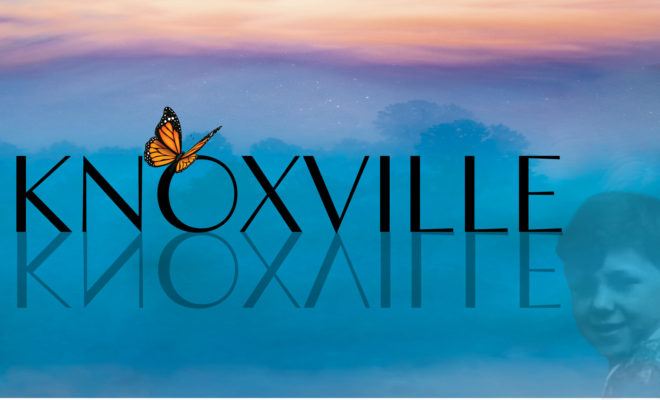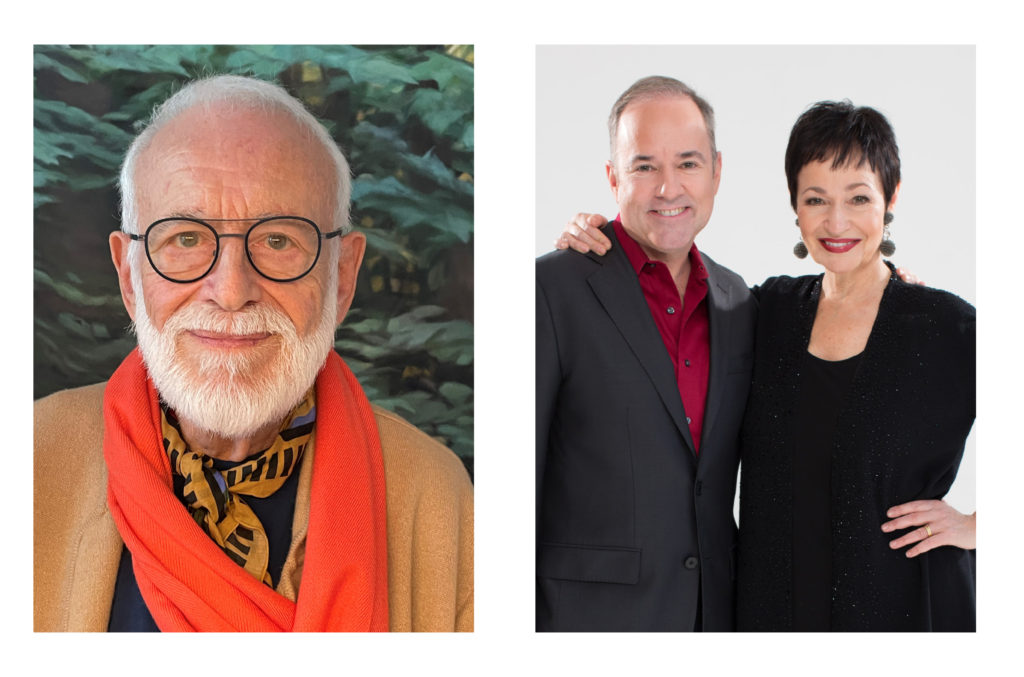
Feature
Worth the Two Year Wait: Asolo Rep’s World Premiere of Knoxville
By Ryan G. Van Cleave | April 2022
While our community is blessed with a wealth of live theater options, we count on Asolo Rep to deliver Broadway-worthy gems each season. Tony-winning director Frank Galati’s new musical Knoxville was supposed to be one of those can’t-miss gems…back in April 2020. The arrival of COVID-19 derailed the show, which was based on James Agee’s Pulitzer-winning autobiographical novel A Death in the Family. With music from the Tony-winning team of composer Stephen Flaherty and lyricist Lynn Ahrens—who collaborated with Galati on the Broadway production of Ragtime—this musical was poised to be a major cultural event in Sarasota.
As they say in theater, “The show must go on!” and while it’s taken some time, for Knoxville, the show will finally go on. Thanks to a generous grant from The Roy Cockrum Foundation, Knoxville will premiere this season to live audiences. Previews are April 15-22, followed by a full run from April 23-May 11.
The following is an interview conducted with Frank Galati, Stephen Flaherty, and Lynn Ahrens.

I remember there being a lot of hype about this two years ago. And here we are again. What was it like to have that delay?
Galati: It was unprecedented, shocking, and maddening. We were on the brink of setting our feet on the stage for the first time—we had our last run-through in the rehearsal room on a Sunday. By Tuesday, the show was postponed.
Unexpectedly, we had handed to us the most precious commodity you can have in the theater: time. Time for it to stew, to simmer, to seep in. We held fast to the conviction that no matter how unbelievably chaotic and cruel the world is, people still needed to hear the simple universal story of a father and a mother.
Ahrens:Whenever you start technical rehearsals and move toward previews, you always think it’s done. And then you watch the audience reaction and realize “Oh my God, it’s NOT done!” The delay gave us years to imagine it and to think about it. We made very meaningful, substantial changes. It’s taken on some new resonances over the past couple of years. Now we’re going back and we’re thinking it’s done. But of course, it’s not!
Flaherty: For me, it’s been about resilience. It’s about going through catastrophic events, trying to make sense of those events, and trying to create something that’s beautiful and meaningful from it. That’s really what this show is about as well. For two years, we’ve been starving for that kind of connection, that kind of community.
There have been various adaptations of Agee’s story already. Where did you see new ground?
Flaherty: I purposely waited until I was well within the process to even see what the television movie was like and what the feature film adaptation had been. I’d never seen it on stage before. I’d read the book, but that was years ago.
I think the sound of our show is radically different from other versions, and that’s a conscious choice. It was the same thing as when we were working on Ragtime, where I purposely didn’t revisit the film version which featured Randy Newman’s first film score. He did a wonderful job, of course, though his take on it wasn’t my take. I wanted to have my own personal stamp.
Galati: I’ve known the novel for many years. It’s so striking, so moving, so complex. In the couple of years that we’ve been working on it, if somebody says, “What are you doing?” and I tell them, they almost always say, “Oh, I’ve never heard of that.” Yet James Agee was a popular poet and a respected film critic who wrote pieces for Time magazine in the 40s. At the time of his death at 48, he was very well known. Why he hasn’t remained more in the forefront is something of a mystery to me. Perhaps people are daunted by poetry?
A Death in the Familyis a riveting story and its bone true. The ego pronoun of the narrator is James Agee, and this is the story of his parents and his first six to eight years of life. He didn’t change the names. It’s incredibly personal. I called on my dear friends Stephen and Lynn to ask, “Do you know this? Can I send you a little outline?” The thrill of the conversations that we had when we first started talking about it felt amazingly liberating.
Ahrens: I knew of A Death in the Family, but I’d never read it. So, when Frank reached out to us, we read the play, which was a beautiful adaptation—very straightforward, honest, and touching. And then I read the novel. Now, we lyricists love language, so when I read that novel, it was like the top of my head blew off. “There are songs on every page, and I can go here, and we can do a song there!” It was so exciting and emotional because the songs were flying off the page of the novel and wanting to go into Frank’s play.
Flaherty: There was something about the ensemble nature of this story. Even if it was just a two-character scene, I wanted to see if we could find a way to keep the group energy of the storytelling present. I began to think of how people entertained themselves back in 1915. Around that time, every house had a piano and people would use music to entertain one another. Or they’d play a guitar on the porch. I said to Frank, “Maybe our actors should also be able to play instruments, and they should be able to accompany the scenes, even if they’re not technically in the scene. They could be playing an instrument or singing as vocal underscoring.” We did an early reading of the first draft in New York City, and I said, why don’t we just try this idea on two or three of the numbers, just to see how this would interface with the rest of the show. We wound up doing five or six numbers, and it was amazing. It worked.
In all your experience of working with Knoxville, what has been the most surprising thing for you? Other than the COVID delay, of course!
Galati:For me personally, looking at what was there at the beginning of the manuscript and is not there in the published version is terrifying. It is incomprehensively dark and scary. It begins in a nightmare. You remember it, Lynn?
Ahrens: It’s quite different. It’s very dark. I like our adaptation.
Flaherty:We should also point out that the play was originally done in three acts. There’s also a television movie with Sally Field and William Hurt, which is also three acts. Yet when Frank first presented his original draft, it was two acts, so we’d lost an act. Now we are doing it as one act, and it’s very focused, and very rich. There’s something about the one-act structure that feels right for this particular piece.
Another thing that Frank did—and this change happened midstream—was that he allowed James Agee himself to become a character. Our friend, the wonderful singing actor Jason Danieley, now plays the author James Agee. So, we have James Agee at one point in his life, and then we have the young boy version of the same character. That became really interesting to all of us, because there were interesting and sophisticated ways that his present and his past could merge, and how they merged in song had to do with him making sense of these events and what happened, because a child can’t fully understand what they’re going through at the time, especially during catastrophic events. There was something exciting musically about it, and it shows how music can connect the dots across time.
Stephen and Lynn, why is Frank the right person to direct this?
Ahrens: He’s the most brilliant director in America. It’s as simple as that.
Flaherty:Also, Frank’s big interest is taking great works of literature—especially American literature—and finding a way to theatricalize what’s on the page. He did that so brilliantly with Ragtime and with The Grapes of Wrath. Frank really knows how to put the human aspect of a story onto the stage.
Galati: I’m so humbled by my colleagues. Thank you very much.
Why is Asolo Rep the right venue to launch Knoxville?
Ahrens: Frank knows Asolo Rep very intimately—he lives two blocks away, you know! It was just a natural fit since he knows the producing artistic director [Michael Donald Edwards] very well and they’ve worked together before. For us, the size of the theater and the inherent nature of the organization, which is so nurturing and so detail oriented, is a good fit. At Asolo Rep, you’re not only welcomed but you’re supported. You have complete artistic control, but you always feel that if you need anything, you just email or call, and somebody gets back to you immediately. It’s this wonderful hive of creativity.
Galati: We have amazing support from The Roy Cockrum Foundation. They targeted Asolo Rep. They came here under the radar, saw shows, and departed without announcing that they had come. Roy Cockrum was a student at Northwestern at the same time I was, and he didn’t know I was down here. So, I got a call from him, and he said, “Is there anything you’re working on that could use some wider support?” I told him, “Well, there is the idea of doing this musical….” Well, guess what? Roy Cockrum lives in Knoxville.
Ahrens: So, there you have it!
Flaherty: I’d like to add one point. There’s something about the physical proportion and space in the theater building itself that is absolutely perfect for this particular show. After we began discussing the possibilities for this musical, I was able to fly down and see a wonderful chamber-size production of Ragtime in the theater. I was able to go to the opening, and I saw it from the orchestra section. Then I went to the matinee the next day and I was able to watch it from the mezzanine. There’s something very intimate about the feel of Asolo Rep’s physical space that I thought felt perfect for this show.
It helps me develop the music whenever I know the physical space where we’re going to be telling the story because I can visualize it. I know what it’ll sound like. So, that was a real help knowing that this was where we’re going to give birth to this particular piece.
Last question. What’s the most important thing people should know about Knoxville?
Galati:There’s joy in the heart of it. It celebrates the dignity and depth of the human heart.
Ahrens: It’s a celebration of a town and a family and how we all go through crises together. And in these times where we’ve already been through two years of one crisis after another, it seems like an appropriate musical to celebrate coming out of that with joy. With theater. With music.
Flaherty: The thing I find incredibly moving is that it’s about what an American family can endure and how it finds a way to go forward as a family, and how you can take something harsh and create beauty. I think that that’s why we all go to the theater. We want to be moved by other people’s stories. By doing that, we see ourselves in these stories.
For more information about Knoxville, please visit asolorep.org or call the Box Office at 941.351.8000.



You must be logged in to post a comment Login